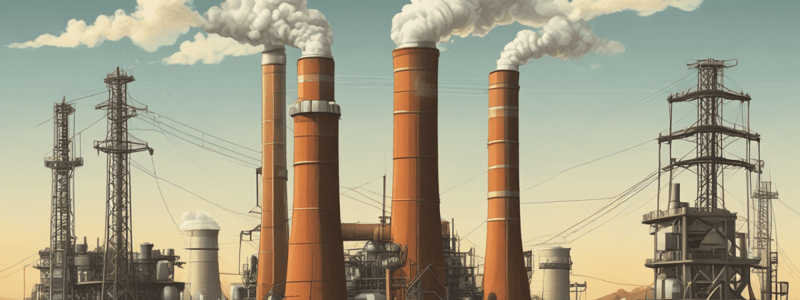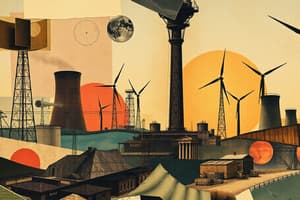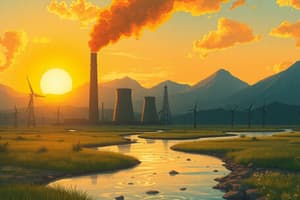Podcast
Questions and Answers
Most of Earth's energy comes from the ______
Most of Earth's energy comes from the ______
Sun
The ______ energy of earth makes geothermal power available
The ______ energy of earth makes geothermal power available
internal
Tidal energy is generated from the ______ current
Tidal energy is generated from the ______ current
ocean
Fossil Fuels are formed from ______ organic matter
Fossil Fuels are formed from ______ organic matter
Coal is a ______, blackish substance formed from OM
Coal is a ______, blackish substance formed from OM
Oil is a ______, blackish liquid consisting of many types of hydrocarbon molecules
Oil is a ______, blackish liquid consisting of many types of hydrocarbon molecules
Natural Gas is a gas consisting primarily of ______ (CH4) and lesser amounts of other volatile hydrocarbons
Natural Gas is a gas consisting primarily of ______ (CH4) and lesser amounts of other volatile hydrocarbons
The problem is that we are depleting the ______ fuel reserves
The problem is that we are depleting the ______ fuel reserves
Fossil Fuels have a high ______ content
Fossil Fuels have a high ______ content
FF are used for ______, Industry, and transportation
FF are used for ______, Industry, and transportation
Non-Renewable energy resource is used _______________________ than it is replenished.
Non-Renewable energy resource is used _______________________ than it is replenished.
Mountaintop mining for coal can cause _______________________ and disrupt rivers.
Mountaintop mining for coal can cause _______________________ and disrupt rivers.
Drilling for oil can be done in both _______________________ and oceanic habitats.
Drilling for oil can be done in both _______________________ and oceanic habitats.
The burning of fossil fuels increases _______________________ in the atmosphere.
The burning of fossil fuels increases _______________________ in the atmosphere.
Solar energy can power human consumption for _______________________ years.
Solar energy can power human consumption for _______________________ years.
Wind turbines convert the wind's kinetic energy into _______________________ energy.
Wind turbines convert the wind's kinetic energy into _______________________ energy.
Wind speeds are on average _______________________ greater over water than over land.
Wind speeds are on average _______________________ greater over water than over land.
Geothermal energy is harnessed from _______________________ water and steam.
Geothermal energy is harnessed from _______________________ water and steam.
Wave energy harnesses the motion of the _______________________ waves and converts their energy into electricity.
Wave energy harnesses the motion of the _______________________ waves and converts their energy into electricity.
Tidal energy harnesses the energy by erecting dams across the outlets of _______________________ basins.
Tidal energy harnesses the energy by erecting dams across the outlets of _______________________ basins.
Oil is a fossil fuel that is formed over a few years.
Oil is a fossil fuel that is formed over a few years.
Natural Gas is primarily composed of methane (CH5).
Natural Gas is primarily composed of methane (CH5).
Fossil fuels are a renewable energy resource.
Fossil fuels are a renewable energy resource.
Coal is a soft, fluffy substance formed from organic matter.
Coal is a soft, fluffy substance formed from organic matter.
Tidal energy is generated from the wind current.
Tidal energy is generated from the wind current.
Drilling for oil can only be done in terrestrial habitats.
Drilling for oil can only be done in terrestrial habitats.
The upfront costs of solar energy technology are low.
The upfront costs of solar energy technology are low.
Wind turbines can be erected in areas with low wind speeds.
Wind turbines can be erected in areas with low wind speeds.
Geothermal energy can be harnessed indefinitely.
Geothermal energy can be harnessed indefinitely.
Burning fossil fuels decreases carbon in the atmosphere.
Burning fossil fuels decreases carbon in the atmosphere.
Flashcards are hidden until you start studying
Study Notes
Fossil Fuels and Alternative Energy
- Most of Earth's energy comes from the Sun
- Internal energy of Earth (core) is available for geothermal power
- Tidal energy is generated from ocean currents
Non-Renewable Energy Resources: Fossil Fuels
- Have a high energy content
- Used for electricity, industry, and transportation
- Formed from ancient organic matter over millions of years
- Coal: hard, blackish substance formed from compressed organic matter
- Oil: thick, blackish liquid consisting of many types of hydrocarbon molecules
- Natural Gas: gas consisting primarily of methane (CH4) and other volatile hydrocarbons
Problems with Fossil Fuels
- Depleting fossil fuel reserves
- Non-renewable energy resource (used faster than replenished)
- Known world usage of fossil fuels will peak and run out
- Need to find alternative solutions
Obtaining Fossil Fuels
- Mountaintop mining for coal
- Drilling for oil in terrestrial and oceanic habitats
- Offshore oil rigs
- Hydraulic fracturing of shale for oil and gas (fracking)
Impacts of Fossil Fuel Use
- Release of pollutants into the environment
- Burning fossil fuels increases carbon in the atmosphere, leading to:
- Global warming
- Ocean acidification
- Increase in habitat destruction and negative impact on biodiversity
Renewable Energy Resources
- Goal: provide energy for three types of applications:
- Generate electricity
- Heat air and water
- Fuel vehicles
- Much debate in some nations over feasibility of completely switching to renewables and away from fossil fuels
Solar Energy
- Every day, the Earth receives enough solar energy to power human consumption for 25 years
- Passive Solar Energy Collection: buildings designed to maximize absorption of sunlight
- Active Solar Energy Collection: uses mechanical and electrical equipment to focus, move, or store solar energy
- Benefits:
- Sun expected to burn for 4-5 billion years
- Decentralized power control over energy
- No emissions of greenhouse gases or other pollutants
- Disadvantages:
- Upfront costs of technology are expensive
- Need to be in an area exposed to a lot of solar energy
- Intermittent resource
Wind Power
- Harnesses wind power from air movement using wind turbines
- Wind turbines are often erected in groups (wind farms)
- Benefits:
- No emissions of greenhouse gases or other pollutants
- Can get a return on final investment
- Can be used at multiple spatial scales
- Landowners can lease their land for wind development
- Disadvantages:
- Expensive upfront
- Need to be in an area with a lot of wind
- Intermittent resource
- Folks might not like having a wind turbine nearby
- Birds and bats sometimes killed when they fly into the turbine
Geothermal Energy
- Harnesses thermal energy from beneath the earth's surface
- Can be harnessed directly from geysers at the surface or through wells drilled down hundreds or thousands of meters
- Geothermal power plants harness energy from naturally heated underground water and steam to generate electricity
- Benefits:
- Reduce greenhouse gas and pollutants compared to fossil fuel combustion
- Jobs created
- Disadvantages:
- Geothermal power plant cannot operate indefinitely
- Geothermal activity in the earth's crust naturally shifts over time
- Restricted to regions where energy can be tapped from naturally heated groundwater
Ocean Energy Sources (and Freshwater)
- Harnesses energy from tides, waves, and currents
- Wave energy: harnessing the motion of the oceans' waves and converting it into electricity
- Tidal Energy: erecting dams across outlets of tidal basins to generate electricity
Studying That Suits You
Use AI to generate personalized quizzes and flashcards to suit your learning preferences.



